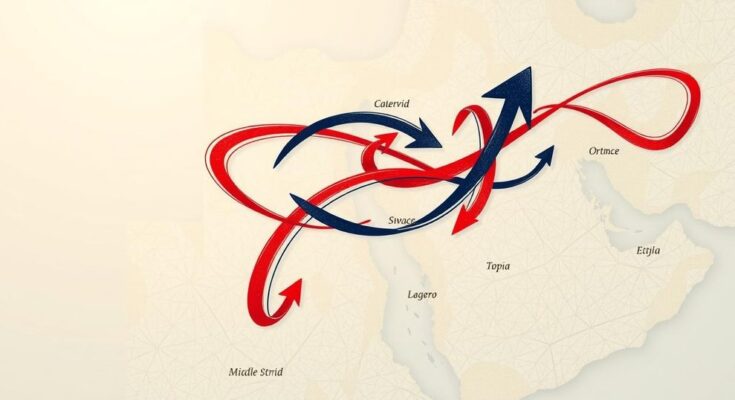As Syria transforms following the decline of Assad, Iraq is compelled to reassess its regional role and security strategy. The Iraqi government faces complex challenges as it seeks to bolster border security and address new threats arising from the shifting political landscape in Syria. Balancing relations with the U.S. and Iran remains critical for Iraq’s national interests in this evolving context.
As Syria undergoes significant changes following the potential decline of Assad’s regime, Iraq faces the imperative to redefine its role in the Middle East. The shift provides Iraq an opportunity to enhance border security and mitigate domestic threats, necessitating a careful navigation of regional power dynamics and foreign relations, particularly with the United States, in light of Iraq’s national security concerns.
Iraq has a complex history with Syria, particularly following the 2003 U.S. invasion, which destabilized the region and allowed terrorist groups to infiltrate. The regime in Syria under Assad was instrumental in these incursive terrorist acts, leading Iraq to highlight these violations internationally, as seen during former Iraqi Prime Minister Nouri al-Maliki’s appeals to the United Nations for investigations into the Assad regime’s role in violent attacks.
However, in the wake of the Syrian uprising in 2011, Iraq adopted a pragmatic stance towards Assad. Although the regime posed no threats during the civil war, the rise of ISIS in 2014, manifesting as a direct attack from Syria, illustrated the fragility of security for Iraq, culminating in extensive military efforts to reclaim lost territories.
Now, with Assad’s influence waning, Iraq must reassess its security posture, particularly with Ahmed al-Sharaa emerging as the new leader, despite his dubious terrorist affiliations. Iraq’s geographical reality means it cannot overlook the potential risks posed by the new Syrian leadership, especially regarding the security threats along its 372-mile border with Syria, including the complications of the existing power struggle within northeastern Syria.
To address these challenges, Prime Minister Mohammed Shia’ Al-Sudani has engaged in dialogue with the new Syrian leadership, identifying security concerns pertinent to Iraq. Additionally, Iraq’s participation in regional discussions, such as the January 2023 meetings in Saudi Arabia, underscores its proactive stance in addressing these emerging threats and stabilizing relations within the region.
Iraq’s immediate concern is to secure its extensive border with Syria while simultaneously managing pressures from various factions, including Iran, which seeks to reclaim influence in the region. Concurrently, Iraq must renegotiate its bilateral ties with the United States, especially regarding troop presence in light of the evolving dynamics surrounding Syria’s political landscape.
Sudani’s recent visit to Iran highlighted Iraq’s balancing act, revealing ongoing complexities in negotiations concerning U.S. troop withdrawal and the influential role of Iranian-backed forces. The statements from Iranian leaders reinforcing the significance of U.S. withdrawal and the strength of Iranian-affiliated militias shed light on the continuing geopolitical tensions influencing Iraq’s strategies moving forward.
Ultimately, Iraq’s government faces the challenge of recalibrating its regional role amidst the uncertainties presented by Syria’s transition and the corresponding shifts among major regional and international stakeholders. Adapting to the post-Assad landscape will be crucial as Iraq seeks to secure its national interests while navigating a complex web of alliances and rivalries in the Middle East.
The article discusses the shifting geopolitical landscape in the Middle East following changes in Syria, particularly regarding Iraq’s strategic position. After the fall of the Assad regime, Iraq is presented with unique opportunities and challenges, including ongoing security threats and the necessity to manage relationships with key players in the region, including Iran and the United States. The historical context, stemming from previous conflicts and the rise of terrorist organizations like ISIS, underlines the complexity of Iraq’s situation as it re-evaluates its security framework and foreign policy in response to developments in Syria.
In conclusion, the fall of Assad’s regime presents Iraq with both challenges and opportunities as it navigates a new geopolitical reality. Iraq must enhance its border security while recalibrating its foreign relations, particularly with Iran and the United States. With the emergence of new leadership in Syria and the ongoing threats from terrorist organizations, Iraq’s capability to adapt to these changes will significantly influence its stability and security moving forward.
Original Source: www.atlanticcouncil.org




